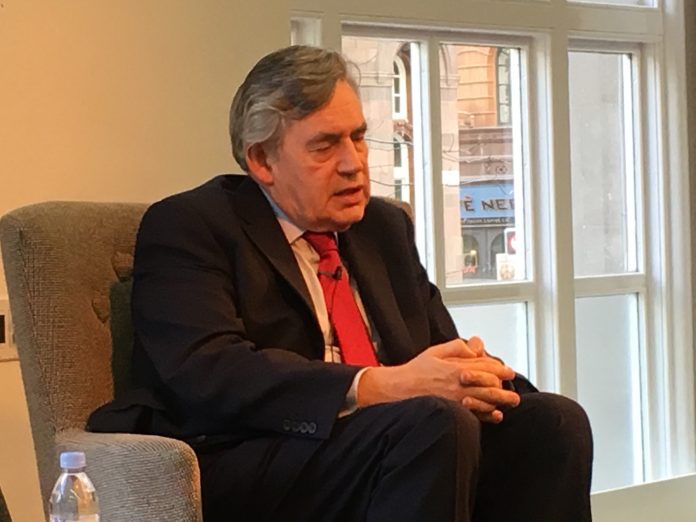About Manchester sees the former Prime Minister in the flesh and is pleasantly surprised
Manchester born writer Anthony Burgess’ most famous work A Clockwork Orange, when published in America,saw its final last chapter taken out by the publishers.
It was an important chapter in the mind of Burgess because after all the violence and hatred of the book, it was the one that gave hope that the central character had seen the light and a better future from that portrayed in the first twenty chapters.
It was a crucial omission because the American version was used by Stanley Kubrick to base the film of the same name around, so cinema audiences were denied that hope that Burgess wanted to portray.
Former Prime Minister Gordon Brown in Manchester this week used that anecdote in his talk at the Central Library on his nationwide tour promoting his new autobiography to say that what the world needs now is a Chapter twenty one, the vision of a better future.
Already well trailed in the media and in some circumstances criticised for not answering some of the questions that people wanted to hear, the TV and media image of the dour Scot was quickly banished in front of a packed lunchtime audience.
Introduced by his former cabinet colleague and now Mayor of Greater Manchester, Andy Burnham, whose career in cabinet began under Brown in 2007, he quickly charmed the audience with stories of of Einstein, his first political experience in Westminster and a rogue interview with a Radio Station down under.
Brown first arrived in Westminster in 1983, not the best of times to arrive for a Labour member looking for a long career as the party had just crashed to its worse post war election defeat at the hands of Mrs Thatcher.
The Daily Telegraph inits profiles of new members his age wrong, saying he was born in 1926, and Brown as the mistake was picked up by other media, found himself being referred to as the veteran member.
He was given to the opportunity to be interviewed by what he thought was an Australian Radio station, showing his ability to name drop the Aussie Prime Minister and show his knowledge of Australian politics, only to find out that he was talking to Radio Auckland and remembered when he sent the audience at what rally to sleep, speaking on pensions for forty five minutes and letting their lunch go cold, having misheard that it was supposed to be 4-5 minutes.
Then to the serious stuff.Brown talked s of the great changes in the last 40 years, the move to globalisation, a Manchester which once produced goods for the world forced to reinvent itself.
“We have been during that time swimming against the tide of the shrinking of the state, the economic liberalisation, which emanated from the United States and promoted by Thatcherism.” he told the audience”
The policy never allowed for the weak in society.New Labour, he claimed tried to address that view “swimming against the tide.”Sure Start, tax credits were all part of that plan.
“How can you combine social justice with economic growth is the problem he says we are grappling with
Citing his friendship with Nelson Mandela whom he say taught him what real leadership was about, treating everybody as equal not matter what, he recalls Mandela calling the Queen, Elizabeth and asking how the Duke was.
People had come to hear about the financial crisis, “the biggest thing we had to deal with” exploding out of America in 2007-2008, he remembered just how close the world came to economic collapse.
Thirteen of 14 US banks were in danger of imploding, Lehman Brothers, the run on Northern Rock and the realisation that the deregulated financial sector had created a shadow banking system that was impossible to regulate.
I am sure that when historians look back at this period, Brown will stand alone as the man who saved the world economy from implosion.
He quickly recognised that it was an international problem.something that one country on its own couldn’t solved, hence his journey round the world’s capitals, countries were blaming America for the problem, which had originated in its sub prime markets.
In London, the G20 decided to stimulate the world economy, a move that almost certainly averted a world wide recession.He regrets that the deficit stimulus wasn’t followed after 2010, instead the U.K. was plunged back into recession by the deficit cutting coalition.
Which i suppose brings us back to the central issue of Gordon Brown. How a man who always wanted to be prime Minister, turned up in office, seemingly bereft of ideas and why the enigmatic and outgoing personality which manifests itself in front of a few hundred people in Manchester Central Library was never seen by the public at large.If it had, just perhaps the result in 2010 may have been so much different







